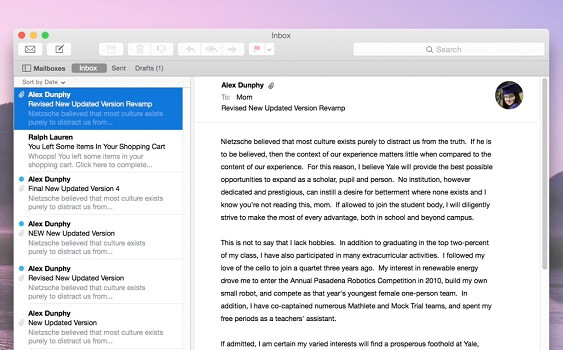Senior year of high school: You finally made it. The past three years may not have mirrored One Tree Hill as much as you hoped, but who cares? You worked your butt off and now you can sit back, relax and enjoy smooth sailing from here to graduation. Right? Wrong. One final task lies before you: applying to college. Before you fall from a heart attack, take a deep breath. Whether you’ve meticulously planned since freshman year or find yourself just now drowning in a sea of college apps and personal recs, you still have time to get the golden ticket to the college of your dreams.
The Application Process
Scope Out Your Options
Where do you even begin your college search? If you feel scared and confused by your peers, family and guidance counselor asking you questions about your future when it took you 20 minutes just to decide what type of cereal you wanted this morning, websites like Cappex or Niche will become your best friend. By naming a few preferences, they generate a list of colleges that match your desired criteria. From there you can then move on to resources like CM’s college guides. From quick stats to brutally honest accounts from the student body, you’ll find everything you need to narrow down your college search.
Fill Out the Application
You’ll most likely fill out your applications online (who even uses paper anymore?). Make sure that your laptop is fully-charged and plugged into an outlet. You don’t want to be just about to hit submit only for your laptop to die. Second, gather all this information and keep it within reach:
- Transcripts (your guidance counselors can send these in)
- Standardized test scores (SAT and ACT)
- Recommendations (though most teachers submit theirs online)
- Essays
- Social security number (write it down so you don’t have to ask mom and dad every time you need it)
- Financial info
- A credit card number to pay the application fee
Decision Day: May 1
You patiently (or not-so patiently) waited months to hear back from each college. If you find yourself lucky enough to get accepted to more than one university, congrats! But now, you need to make the ultimate decision: which one do you actually want to go to? Channel Rory Gilmore and use the tried-and-true pro-con list to weigh the following:
- How far from home are you willing to go?
- Do you prefer a rural or urban setting?
- Do you prefer small seminars or large lectures?
- What about study abroad opportunities?
- Are you into a big Greek life scene?
- How much does it cost?
- How many majors are offered?
If you live near any of the campuses, take a road trip so you can see if the campus feels like home. If all else fails, rely on your gut. You know yourself better than anyone else, so if one college screams your name, trust it.
How does the Common App work?
The Common App is your one-stop-shop for most college applications. While not used by every school, almost 700 colleges allow eager high school students to submit all of their personal info (i.e. address, social security number, finances) under one account to streamline the application process. Each school will see your standard personal statement, but keep in mind that many universities will also ask for supplemental essays.
How many safety and reach schools do I really need?
No secret formula of how many safety or reach schools you should apply to exists. Should you only apply to Ivy Leagues? Probably not. Might it be a good idea to apply to a school you know will accept you? Definitely, but don’t waste your time applying to a school you have no interest in attending. It comes down to good judgement and self-awareness. Apply to the school of your dreams and a few others you could see yourself happy at, but don’t waste an application fee on a college you really dislike.
What are the different types of admissions deadlines?
- Regular Admissions will be used by most of the colleges you apply to this fall. As you may guess, regular admissions doesn’t throw any funny business at you. You have a set submission date, usually between November and February, and you hear back on a set date in March.
- Rolling Admissions works on a first-come, first-serve basis and allow students to submit applications any time throughout the year.
- Early Action should be used by those who like to get things done early. Your application will be due in the fall and you’ll know whether or not you were accepted by the end of the calendar year. Apart from saving you from a winter break meltdown over upcoming deadlines, applying early action means you’ll be compete against fewer applicants, giving you a better chance of standing out.
- Early Decision, like early action, requires you to submit your app earlier, but with one catch: If admitted, you legally must attend. You may only apply to one school early decision. Only choose this option for a school you would sell your soul to attend, as showing this level of dedication may give you the edge you need to beat out every other stellar GPA and SAT score.
How do I ask for personal recommendations?
When senior year hits, you can bet teachers get hit with requests to write personal recs on the daily. The earlier you ask, the better chance your fav teacher hasn’t already committed to five other students. Choose a teacher who has watched you persevere through AP Biology exams or five pages essays on Shakespeare and ask in person. Explain why you want them to be the one to sing your praises. Give them plenty of time before the deadline and send them a courtesy reminder a week before the deadline hits. Most importantly: Don’t forget to say thank you.
What happens if I don’t get in anywhere?
You may feel the weight of the world crash down when you open that taunting rejection email, but step back for a sec. Despite the fact that everyone around you spent the past four years of your life acting like college is the end-all-be-all, you have other options. Save money and get those entry-level English and math classes out of the way at your local junior college. Hell, go to community college all four years. At the end of the day, a degree is just that—a degree. If your brain over-fried in high school, take a year off. If Malia Obama can do it, so can you. You can also fill that time with travel or work. Experience can teach you more about yourself and the real world than any classroom. Once you’ve taken the time to let your brain detox and reinvigorate your passion for learning, apply again.
Top 3 Mistakes Students Make on Their Application
1. Forgetting to Proofread

No matter how strong of a grasp you think you have on the English language, you still need to proofread. You don’t want to kick yourself for submitting an essay on how “Collage will help you achieve all of your dreams.” Spellcheck may be good, but it can’t—and more importantly won’t—catch everything. Take the time to print a hard copy, grab a red pen and prepare to tear your grammar to shreds. Once you think you caught everything (trust us, you didn’t), read it out loud. Totally embarrassing, but you won’t care when you score an acceptance letter (or email, let’s be real) to your dream school.
2. Not Following the Essay Prompt

You spent hours, days even, crafting a beautiful, eloquent essay that starts by detailing your extensive experience at your local animal shelter and blooms into a moving piece on your plans to change the world. That admissions officer doesn’t stand a chance. Hell, even Shakespeare would be impressed. But then you move onto your next college app and—uh oh—they want you to write about a time you failed and what that meant to you. As tempted as you may be to throw in a sentence or two to try to salvage your masterpiece, the admissions team will see right through you. If they don’t think their college earned its own essay, you can wave bye-bye to that acceptance letter.
3. Sounding Like an Ego-Maniac

Admissions officers want to see confidence, not arrogance. So if you feel like a jerk reading what you wrote out loud or if you know your friends would roast you for it, delete it. If you have trouble finding ways to highlight your many, many attributes in a modest way, try getting really specific. Trade in the grandiose statements of how many lives you improved through your volunteer work for a specific example of a direct impact your work made. That way, the admissions officer will get the message of your awesomeness without you rubbing their nose in it.
Top 3 Twitter Accounts
1. The College Board — @CollegeBoard
It's college visit season! Here are some things to keep in mind when you're on campus. pic.twitter.com/UKLd8sn0vq
— The College Board (@CollegeBoard) September 6, 2016
College Board covers all your bases when it comes to applying to college. From prepping you for the SATs to notifying you about AP tests, they won’t let your college goals slip your mind. They act like your sometimes irritating best friend who does everything in their power to help you succeed (and who you’d be totally lost without).
2. Federal Student Aid — @FAFSA
Two *Major* FAFSA changes you need to know about: https://t.co/YX9ZNb135s pic.twitter.com/jRkw3MGR05
— Federal Student Aid (@FAFSA) September 8, 2016
You have enough deadlines to keep track of, so get a little help by following Federal Student Aid on Twitter. They’ll let you know about upcoming deadlines so you can stay on top of your financial aid. They also have #AskFAFSA hours where you can tweet the team your questions and get live answers.
3. @(Insert University’s Admissions Office)
For helpful tips from U-M experts on completing the #CommonApp , check out: https://t.co/FqZKDwlaQ0 #Victors2021 pic.twitter.com/3orI8lmc2c
— U-M Admissions (@UMichAdmissions) August 3, 2016
You already “liked” your dream school on FB and get pics of the campus on your Instagram feed, so make sure you follow their admissions office on Twitter. Get tips and hints of what they look for in prospective candidates and show your interest in the school by liking and retweeting their posts.
STILL FREAKING OUT ABOUT GETTING INTO COLLEGE?
The Top 10 Most Difficult College Applications in the Nation

The Top 10 Hardest Colleges to Get Into

The 10 Best Colleges for Freshmen




















